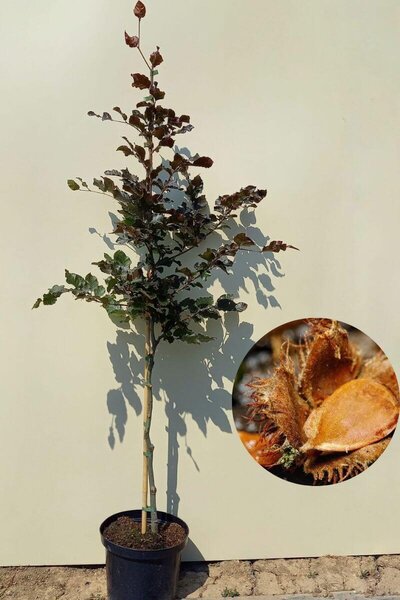Young Red Column Beech tree | Fagus sylvatica 'Dawyck Purple'
Are you looking for a narrow upright growth and beautifully glossy purple-red leaves? Those are the most striking features of the Fagus sylvatica 'Dawyck Purple'.
Discount!
- Quantity Discount Per piece
- -10% €46,58 Incl. VAT
Guaranteed damage-free delivery
Free shipping from €150,- (International)
Can be planted throughout the year
Leaf Color
The Fagus sylvatica 'Dawyck Purple,' also known as the Red Column Beech, is a well-known tree with stunning leaf colors.
The leaves of the Fagus sylvatica 'Dawyck Purple' emerge reddish-purple in spring, gradually turning dark purple in summer. In the fall, they transition to brownish-red hues before partially falling from the tree. Some leaves will remain on the tree until it regrows in spring.
Branching
The Red Column Beech has dense and tight branching, making it particularly suitable as a standalone tree in a location where it has limited space to spread out.
Flowering
The Fagus sylvatica 'Dawyck Purple' blooms with inconspicuous flowers in the month of May.
Beechnuts
After flowering, characteristic beechnuts appear in the autumn. These nuts are enclosed in a green to brown husk on the tree, which is lightly hairy.
Location
The Fagus sylvatica 'Dawyck Purple' thrives on nearly any nutrient-rich, well-draining soil.
Especially on nutrient-rich sandy soil, the Fagus sylvatica 'Dawyck Purple' will flourish. On wet clay soil, this tree may be less comfortable.
Pruning
Due to its columnar growth habit, this tree requires minimal pruning, making it a low-maintenance tree.
How to plant the tree?
- Determine the final location of the tree and ensure it is free from cables, debris, old plants, and other obstacles that may hinder the tree's growth.
- Dig a planting hole that is twice the width of the root ball. Loosen the soil at the bottom of the planting hole and mix the excavated soil with (organic) garden soil or planting substrate.
- Adjust the planting hole to the height where the root ball fits and firmly press the soil.
- Fill the planting hole with water and wait for it to settle. Check if the root ball is sufficiently moist.
- Place the tree or plant in the planting hole. It is extremely important that the tree is not planted too deep, as this can cause root rot.
- Insert a tree stake or bamboo stake firmly into the ground on the side of the tree where the most wind comes from.
- Now, place the watering ring or create a mound of soil around the tree so that water can seep into the ground.
Why Choose a Young Tree from Amitis
- Easy to plant yourself due to the compact size and light weight
- Conveniently delivered to your home in a sturdy packaging
- Experience the growth and development of your own tree
- Easy to maintain
- Cultivate the size and growth form you are looking for
- Attain mature size within a short time
- Can be planted year-round as everything is delivered in pots
- No root loss and better chances of establishment as everything is pot-grown
- Cost-effective purchase
- Fresh, healthy plants directly from the grower
Questions?
Want to know more about pruning? Read our page on tree maintenance! Feel free to contact us; we are happy to assist!
Specifications
-
Flower color
-
Flowering months
May -
Location
Sun semi-shade -
Fruits
Beechnuts -
Evergreen
-
Winter hardiness
-
Leaf color in summer
-
Leaf color in autumn
Reviews(2)
- Add your review
-
-
-
"De bomen zagen er super uit."
-
- Karin Zuidersma
-
-
-
-
"De planten waren allemaal in goede mooie staat."
-
- Henk Mens
-













